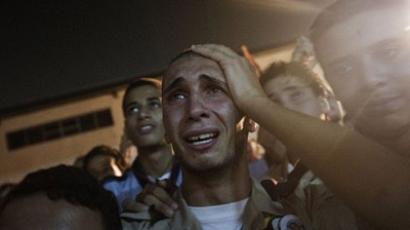Oil to make Libya new “puppet democracy”?
After NATO forces move out of the North African state, Libya may become a “puppet” state under the sway of international energy companies seeking swift access to the country’s oil, experts believe.
While a contact group comprising 60 countries is meeting on Thursday in Paris to discuss the future of post-Gaddafi Libya, Almond, an international relations expert from the Oxford University, doubts the NATO will move out of Libya after the new regime is established and Colonel Gaddafi caught. "We have purely a dance being played out: at times the NATO alliance are taking action bombing targets that could threaten civilians, but Special Forces from the individual NATO countries not under NATO command take action to support the rebels’ political and strategic goals”, Almond claims.In the emerging situation, suggests Almond, NATO’s military forces will officially quit the country, while alliance staff remain on Libyan soil in an advice and support capacity. “I suspect we won’t see the end of individual expert support – Special Forces, advisors, security help from NATO states on the Libyan ground”, the expert suggests. This foreign military and advisory presence may turn Libya into another puppet regime where the oil pipes and stations – in which Western companies have a vested interest – may become a separate “kingdom within a kingdom” to be protected by international troops in the Western importers’ interests, Almond fears, comparing the scenario to Saudi Arabia. His concerns are fueled by the continuing violence and looting which remain major domestic issues for Libya alongside the scarcity of commodities. The democratic future of the Libyan people has also been called into question, as there is a huge silent majority who have no influence on political life, and even if the elections go ahead, the result will still depend on the minority who hold the guns. But if the general elections lead to a defeat of the National Transition Country, Mark Almond warns, the country may be wracked by another upsurge of violence and plunged back into chaos and bloodshed.
Reports are emerging about a pact between France and the Libyan rebels, landing Paris a 35 per cent share of Libya’s oil.Traditionally, such deals are obscured by a smokescreen of promises about a better future and assurances about it being for the benefit of the Libyan people, explained Lode Vanoost, an international consultant and Former Deputy Speaker of the Belgian Parliament.This pact constitutes “total contempt of democracy” and is exactly what happened with Iraq’s oil.
The whole Libyan campaign has little to do with pro-democratic movements in the Arab world; in fact it looks more like a 19th-century colonial takeover, believes Chris Nineham from the “Stop the War Coalition” based in London.“France is going to get 35 percent of the oil, no doubt Britain will be putting a big claim in for another third or so, other countries will be following suit… That is a direct payment in kind for the massive aerial bombardments, which were carried out by the French. That’s an imperial pay-back!” he told RT.“This is a very, very seedy transitional process that is taking place, and it’s being driven clearly by the Western powers. There has not been any election in Libya and no-one knows who the Transitional Council really are. No-one knows to what extend they have popular support. It’s obviously a matter of great celebration that Gaddafi’s regime has gone, but I fear very much about where this new colonial imposed government is going to take the country,” he added.
Vanoost believes that the decision to maintain NATO’s future presence in Libya was made some time ago “because they know there is going to be trouble coming later on.” At the moment the only common ground uniting the Libyan rebels and NATO is that they are both fighting the remnants of Colonel Gaddafi’s regime. However, “once that’s over – we will have to see what this NTC is going to be worthy of.”Lode Vanoost considers Russia’s decision to recognize Libyan National Transitional Council a pragmatic one because it is the “only way to have a say in the upcoming Friends of Libya conference in Paris,” believes the consultant. This gathering is going to be decisive because “they are going to decide the economic fate of the future Libya.”














